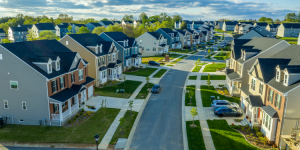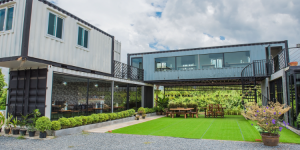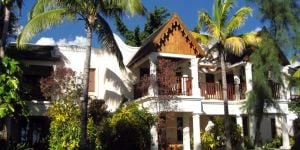
Despite the global real estate downturn, property investment continues to be popular among expatriates. The enduring need for housing ensures its appeal, with the main question being the investment method. Should you build a custom home or opt for a ready-to-move in property?
Building your home abroad
First, consider whether you intend to build a house in your host country for personal use or as an investment in a foreign country (like a second home or rental property). If it's for personal use, being present allows you to closely monitor the construction progress. If it's for investment, it's advisable to enlist a reliable agency to manage the construction on your behalf.
Are you allowed to build abroad?
Before proceeding, you must first determine if your residency status permits you to build in the host country. For instance, in Thailand, foreigners are allowed to purchase 1 rai of land (1,600 square meters) to build a house if they invest at least 40 million baht (over one million euros) in the Thai economy. In Denmark, foreigners can acquire property rights after being tax residents for five years.
What are the steps to building abroad?
After confirming your eligibility to build abroad, the next step is to find a suitable plot of land. Unless you are experienced and plan to undertake the construction yourself (which will still require professional assistance for certain administrative and technical tasks), assembling a reliable team is crucial. This team should help with land acquisition, designing house plans, and ensuring compliance with local standards such as seismic or coastal regulations. You'll also need a notary, lawyer, real estate expert, banker, and possibly an interpreter. Keep in mind that costs can escalate quickly in an inflationary environment with rising raw material prices. Moreover, if you are building in a country other than where you reside, factor in extra costs for travel to periodically check on your construction site.
What are the benefits of building your house abroad?
Building a home abroad offers several benefits. The primary advantage is the opportunity to create your dream home in your chosen country, provided local regulations allow it. Financially, many expatriates opt for countries with lower construction costs than in their home country. Additionally, there may be tax benefits such as exemptions from notary fees or government subsidies like tax credits, depending on the host country's laws. Moreover, owning a house abroad is a solid investment that can secure your financial future.
What should you be careful about?
When building a house abroad, it's crucial to be familiar with the local building standards and regulations. Always work with trusted professionals to avoid scams and ensure there are no hidden defects in your construction. Verify that the land is zoned for building and be mindful of any specific restrictions, particularly if you're building in sensitive areas like coastal zones. Additionally, be aware of the taxes you may be liable for, including property tax, residence tax, wealth tax, and capital gains tax. Depending on your tax residency, remember to declare your assets in both your host country and country of origin to stay compliant with tax laws. Finally, speaking the local language can significantly ease the building process and help avoid misunderstandings.
Buying turnkey
Purchasing a turnkey property abroad often appears more straightforward, as the real estate is already constructed and ready for purchase. However, caution is still essential. It's recommended that you either be present in the host country or be able to make regular visits to ensure that everything is as it should be. This presence can help you thoroughly assess the property, understand the local real estate market, and handle any necessary transactions more effectively.
Are you allowed to buy abroad?
Before purchasing property abroad, it's critical to verify that you are legally permitted to own real estate in the host country. For example, Australia allows foreigners to buy property if it is their primary residence and they obtain approval from the Foreign Investment Review Board (FIRB).
However, in Canada, as of January 1, 2023, foreigners are generally prohibited from purchasing property, with exceptions for temporary workers, international students, and eligible asylum seekers. This prohibition, initially intended to last until 2025 to reduce real estate speculation and help Canadians afford homes, has been extended until January 1, 2027, due to ongoing housing challenges. Despite some criticism over its effectiveness, the Canadian government remains firm in its stance. Non-compliance with this law can result in a significant fine of 10,000 Canadian dollars.
What are the steps for buying abroad?
When buying property abroad, it is essential to adhere to the local laws and regulations. In many countries, a preliminary contract must be signed before finalizing the sale. This contract outlines the obligations of both the buyer and the seller. However, be aware that not all preliminary contracts include a cooling-off or reflection period. For example, in the United Kingdom, Belgium, or Spain, signing a preliminary contract is binding, and you cannot withdraw after signing. In contrast, some countries, like Portugal, do not require a preliminary contract, allowing sales to conclude more swiftly.
It's also important to understand the local taxation laws, financial costs, loan availability, and the administrative and legal processes involved. In some nations, a notary is necessary to complete the transaction, while in others, a lawyer handles the legal aspects of the sale. Always ensure you are well-informed about these elements before proceeding with a property purchase abroad.
What are the benefits of buying your house abroad?
Purchasing a house abroad offers the immediate benefit of acquiring a property that is already constructed. This can often require a smaller financial outlay compared to building from scratch. Whether for investment purposes or as a primary residence, buying a turnkey property allows you to enjoy your investment sooner, provided the property doesn't need extensive repairs. One interesting option for those looking abroad is the Japanese 'akiya'—abandoned houses that are increasingly popular among foreigners. These properties offer a unique compromise between buying an existing home and building anew. Akiyas are typically sold at a lower cost, averaging around $20,000, though prices can vary significantly—from under $15,000 to over $50,000—depending on the location and condition of the property.
What should you be careful about?
When purchasing property abroad, it's crucial to be wary of poor workmanship. Always thoroughly inspect key aspects like the property's location, overall condition, energy costs, warranties, and insurance. Special attention should be given to areas that aren't immediately visible, such as the roof. For example, lofts are popular among expatriates but often do not allow easy access to inspect the roof directly. To mitigate risks, request detailed photographs or drone videos and seek expert evaluations.
This caution is especially pertinent when considering dilapidated properties, such as Japanese akiyas. While these houses are attractive due to their low cost, they are often uninhabitable in their current state and may require extensive repairs or even complete demolition. In Japan, demolition costs can be substantial, and these must be added to the rebuilding budget. The allure of a low price should not compromise safety considerations.
To navigate these challenges effectively, engage with qualified professionals who understand the local real estate market and legal environment. Be aware of additional costs that may accrue, including acquisition fees, notary fees, and lawyer's fees. Like with building a property, you should also be cautious of potential double taxation issues. Surrounding yourself with the right expertise can help ensure a safe and successful property purchase abroad.
Real estate investment: What does the Golden Visa offer?
The Golden Visa, a residence-by-investment program, varies significantly across countries, attracting expatriates with the dual promise of residency and investment opportunities. While some nations are phasing out their programs, others continue to find them a lucrative draw for foreign capital.
In Hungary, the Golden Visa program was revived this summer, granting residency to those who invest a minimum of 500,000 euros (approximately 524,720 dollars) in real estate. Mauritius offers a "Residence by Investment" program, which allows investors to obtain a golden visa by channeling at least 375,000 dollars into government-approved real estate projects. These projects include buying homes in designated innovative regions under the Smart City Scheme, on the secondary market through the Integrated Resort Scheme, or in tourist areas designated for leisure under the Property Development Scheme.
However, the impact of such programs on local communities is mixed and has led to reconsideration in some regions. Spain and Portugal, for example, have announced the termination of their Golden Visa programs for real estate investments due to concerns about exacerbating local housing crises. Greece, facing similar issues, has opted instead to tighten conditions, raising the minimum investment for a home in high-demand areas like Thessaloniki, Mykonos, Santorini, and the Athens region to 800,000 euros, up from the previous 250,000 euros. Other Greek regions maintain a lower investment threshold.
Countries like Switzerland, the United Arab Emirates, Malta, Malaysia (through the My Second Home Program), Namibia, Thailand, Luxembourg, and Indonesia continue to offer the Golden Visa, suggesting its enduring appeal despite controversies. For expatriates, the Golden Visa remains an attractive option, providing the opportunity to acquire property abroad along with benefits like a long-term visa and favorable taxation conditions.




















Comments